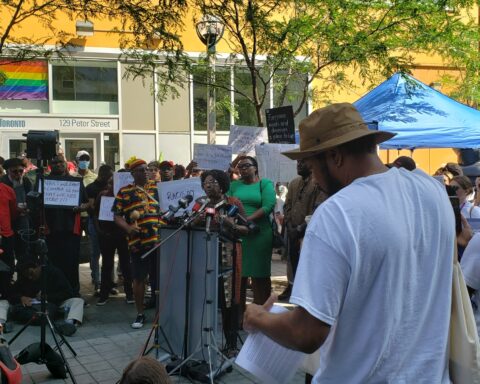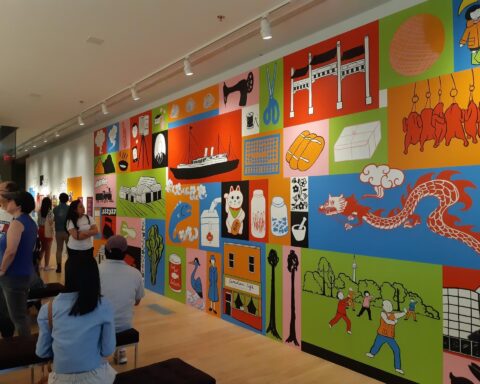To some people, Canada seems like the land of American civil rights hero Martin Luther King Jr.’s dreams. But a group of race relations activists in Ottawa contend that this belies the truth, and that Canadians need to work harder to make King’s vision a reality in this country.
Both views were shared at an Ottawa celebration and awards ceremony that a group named DreamKEEPERS organized to mark the 30th anniversary of Martin Luther King Day.
Originally declared a public holiday in the U.S. in 1986, the same date was chosen by the Canadian organization to honour King’s memory and raise awareness of his message, which was most eloquently articulated in his speech entitled, “I Have a Dream.”
Recognizing King’s values and principles
Sophie Grégoire-Trudeau, wife of Prime Minister Justin Trudeau, presented a lifetime achievement award to the Rt. Hon. Joe Clark, the 16th Prime Minister of Canada (1979-80), described as a leader in fighting apartheid in South Africa and promoting human rights in Canada and the world.
Most recently Clark served as an honorary witness to the Truth and Reconciliation Commission of Canada that reported on residential schools.
The “beloved community,” was [King’s] vision of a society based on justice, equal opportunity and love of one’s fellow human beings.
Daniel Stringer, a former Canadian diplomat and a founding member of DreamKEEPERS, explained that the tabletop award sandblasted with a glass gold leaf is given annually to an individual who has become a role model in Canada and beyond for embodying King’s values and principles.
These include the promotion of social justice, human rights, racial harmony, spiritual values and the advancement of his dream of the “beloved community.”
The “beloved community,” an idea that King popularized, was his vision of a society based on justice, equal opportunity and love of one’s fellow human beings, said Stringer.
Community leadership awards were also presented to Larry Hill, former Deputy Police Chief of Ottawa and Désiré Kilolwa. Originally from Congo, Kilolwa works with women and children who are victims of his native country’s brutal civil war.
“[Canada is a] unique country,” Clark said in his acceptance speech. “The tradition of generosity is deep within us.”
Clark explained that Canada’s very survival depended on all people pulling together.
“Many of us – Black [people], [Jewish people], Vietnamese, Africans – came here as refugees and we are prepared to extend a welcoming hand to others.”
“In the 1970s, visible minorities were few and far between in Canada, but now they are becoming the majority.”
He reminisced about working with past recipients of the same award, including Jean Augustine (first African Canadian woman to be elected to Canada’s House of Commons and the first to serve in the federal cabinet) and Lincoln Alexander (first Black member of the House of Commons and later, Lieutenant Governor of Ontario).
“In the 1970s, visible minorities were few and far between in Canada, but now they are becoming the majority,” Clark observed.
Stepping up to fight injustice
Clark acknowledged that further work needs to be done in promoting equality for all of Canada’s diverse peoples. He cited the example of the Canadian Council of Christians and Jews, founded in response to the Holocaust, which promoted reconciliation and understanding between the two faith communities.
“Perhaps we need a Council of Christians, Jews and Muslims at this time,” he concluded, making reference to the increase in Canada’s Muslim population with the arrival of Syrian refugees.
[U]nlike the U.S., which is more open about its problem with racism, Canada is in denial.
In her keynote speech, Grégoire-Trudeau painted a similar picture of Canada, as a nation that has come a long way in terms of respecting the human rights of its diverse population.
“The good news is that people in Canada, and indeed the world, are stepping up to fight racial and gender injustice,” she said.
She pointed to a new generation of young leaders in Canada and the world, who are far more sensitive to past injustices and are prepared to address them.
“Martin Luther King was an amazing speaker and champion for justice. When he made his “I Have a Dream” speech, the whole world took notice,” she said.
“If Dr. King were here today, he would be proud of Canada because we haven’t refused entry to refugees whose expression of faith is different from ours,” she observed.
Canada in ‘denial’ about racism
As a counterpoint to this image though, Stringer said that Canadian society is often in denial about the racism that occurs here.
He referred to the recent firebombing of a mosque in Peterborough, Ontario, in the aftermath of the shootings in Paris.
He said that unlike the U.S., which is more open about its problem with racism, Canada is in denial.
Rev. Dr. Anthony Bailey of Ottawa’s Parkdale Baptist Church, who hosted the ceremony, also referred to racist graffiti scribbled on his church and racist threats he had received.
“It’s important to celebrate what we have achieved, but also important to keep the momentum going and further the work that still needs to be done,” Bailey said.
Ottawa-based writer/journalist, editor, blogger, communications professional seeking freelance opportunities in political and travel writing.





